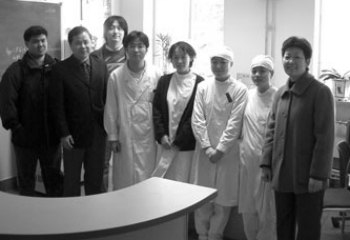Beijing Ditan Hospital Poised to Play Crucial Role as China Increases Treatment Access
January 2004—On World AIDS Day, December 1, 2003, Beijing Ditan Hospital witnessed a pivotal moment in China’s response to AIDS. Premier Wen Jiabao became the first senior Chinese government official to publicly shake the hand of a person living with AIDS. The image was broadcast across China and the world, along with the message that China is finally confronting an epidemic that could become the worst the world has seen.
Premier Wen no doubt chose Ditan because, although one of three leading AIDS hospitals in Beijing, Ditan is considered the major referral center for HIV. Almost anyone who comes to the capital for treatment is referred there. That experience, coupled with the hospital’s research capacity, is why Ditan serves as one of TREAT Asia’s sites in China.

Dr. Zhang Fujie (second from left) and the HIV/AIDS team at Ditan Hospital. |
By official count, there are close to one million people living with HIV/AIDS in China–well below one percent of the 1.28 billion population. Many experts put the figure higher. Whatever the actual number, epidemics in large districts and provinces are foreboding. According to the UNAIDS annual report on HIV/AIDS worldwide, “China’s low national HIV prevalence obscures the fact that serious, concentrated epidemics have been under way for many years in certain regions and are poised to take off in several others.” UNAIDS predicts that 10 million Chinese may be living with HIV/AIDS by 2010.
Ditan, an infectious disease center and home to the first nighttime sexually transmitted infection clinic in Beijing, has played and will continue to play a crucial role in mounting an effective response to HIV/AIDS in the country. Dr. Zhang Fujie, TREAT Asia’s principal investigator at Ditan, heads the Treatment and Care division of the National Center for AIDS Control and Prevention, part of the country’s Ministry of Health, and has worked in HIV/AIDS for more than a decade. With him at Ditan are four clinicians who have seen 600 HIV patients so far. At any given time, they are actively following 200 inpatients and outpatients.
Most HIV patients who come to Ditan are men aged 22 to 50 who make the trip from the central provinces. Many of them were likely infected through blood donation programs in the early 1990s and travel to Beijing for care and treatment, in some cases because they were turned away at their local medical center. Those who receive antiretroviral (ARV) therapy begin as inpatients in the program.
Ditan Hospital was the first site in China to provide ARV drugs. As ARV therapy becomes increasingly available, thanks in part to a recent grant of nearly $100 million from the Global Fund to Fight AIDS, Tuberculosis and Malaria and the government’s pledge to provide free drugs, Ditan is the gateway through which all new treatments must pass. Before any HIV therapy is approved for wider distribution and marketing, it must be tested first at Ditan. The hospital has conducted numerous clinical trials dating back to a 1999 trial that looked at Combivir and Indinavir. Currently, more than 100 patients are enrolled in trials.
Another important contribution Ditan makes to the fight against AIDS in China is sharing expertise with medical centers around the country. According to Dr. Zhang, there are less than 100 doctors in China who are trained to treat HIV/AIDS.
“The Chinese government is increasingly committed to expanding free ARV treatment in China,” said Dr. Zhang. “A few of the primary challenges we are facing are related to our unique situation, in that we are initiating ARV therapy primarily in rural areas, and one of our greatest deficiencies is the number of trained physicians to properly monitor patients.”
Ditan was the first center where doctors from the provinces could learn how to treat their growing HIV/AIDS caseloads, and it continues to provide lifesaving expertise to physicians nationwide and to other training centers being established across the
country.
Kevin Frost, amfAR’s Vice President for Clinical Research and Prevention Programs and director of TREAT Asia, considers Ditan “a center of excellence that can serve as a model–equipping doctors with knowledge of HIV that can be transferred to their communities.”
Ditan is currently the only site in China participating in the TREAT Asia HIV/AIDS Observational Database, with many patients already enrolled in the program.
China faces significant challenges in its fight against AIDS. But Ditan Hospital and the political leadership demonstrated by Premier Wen’s visit to the center are both essential to the country’s progress.